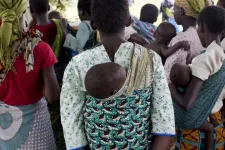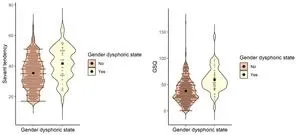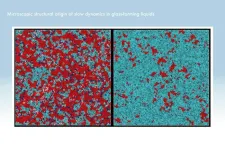(Press-News.org) New international research collaboration to develop and test an improved dietary supplement for pregnant women
Poor nutrition during pregnancy can have serious consequences for both maternal and child health. A new research collaboration – ‘Mother’s Micronutrient Supplement for Pregnancy and Lactation’ (MoMS) – between researchers in Kenya, Norway and Denmark aims to develop and test a new, improved dietary supplement to reduce incidences of low birth weight, improve maternal and child health, and enhance growth and cognitive development in children. MoMS is funded by the Bill & Melinda Gates Foundation and the Novo Nordisk Foundation with a total of DKK 68 million ($ 9.87 million / € 9.5 million).
Women’s nutrient needs increase during pregnancy. While nutrient intake from foods is preferred and is a long-term solution, in many low and middle-income countries, the available diet means that pregnant women are not getting enough nutrients. This can lead to low birth weight, poor maternal and child health and impaired cognitive development. Therefore, in 2020, the WHO recommended the use of MMS (Multiple Micronutrient Supplement) - a daily dose consisting of 15 essential vitamins and minerals. Many countries are today in the process of transitioning from using iron-folic acid alone to MMS as part of the standard for antenatal care.
New global health standards
Excitingly, emerging research suggests that the multiple micronutrient supplement could be further optimized. The reason may be that some of the essential nutrients are not included in the current version of MMS or the doses are on the lower end. Therefore, increased doses and the inclusion of other nutrients in a new and improved MMS version – MMS+ – has the potential to improve efficacy, which is the reason for the MoMS project, says project manager Dr Zipporah Bukania, Senior Principal Research Scientists at the Centre for Public Health Research, Kenya Medical Research Institute (KEMRI):
“Nutrient deficiencies during pregnancy can have serious consequences for both maternal and child health. That is why it is crucial that we improve the nutrition of pregnant women for the benefit of their foetuses and their children. This grant is a great recognition of that, and our goal is that the research will not only improve health in the participating areas, but also form the basis for new global health standards for pregnant women and their children,” says Dr Zipporah Bukania.
Micronutrients with potential for positive effects
The Scandinavian part of MoMS is organised in collaboration with Associate Professor Benedikte Grenov at the Department of Nutrition, Exercise and Sports at the University of Copenhagen and Professor Tor A. Strand from the University of Bergen and Innlandet Hospital Trust. Both have worked for many years on child nutrition in low- and middle-income countries and its impact on children’s growth and development. They believe there is great potential in including more nutrients in MMS:
“Our goal is to develop a new product that includes the two nutrients docosahexaenoic acid (DHA) and choline and higher doses of vitamin B3, since we believe that this can have a positive effect on women, foetuses and children. Specifically, DHA and choline are thought to have a positive effect on children’s cognitive development. So if women and foetuses do not get the necessary nutrients during pregnancy, it can impact the child for life,” says Associate Professor Benedikte Grenov.
The main part of MoMS takes place in the western part of Kenya in Bungoma County. Here, there is a high degree of food insecurity with poor dietary diversity where the diet consists mainly of starchy foods, such as ‘ugali’, made from maize flour or from a mix of sorghum/millet with cassava flour and vegetables. Alternatives to ugali include tubers and roots such as sweet potatoes, while the population has a low intake of fish and animal protein.
A total of 3000 pregnant women will be recruited for the project. The women will be closely monitored throughout pregnancy and after birth, both mothers and children will be examined several times during the children’s first year of life.
Lasting change and improved health
For the Novo Nordisk Foundation, the ambition is also to create the basis for lasting change, says Senior Vice President Arne Astrup, Professor, MD:
“We now know that malnutrition during pregnancy and the first years of life contributes to the development of a wide range of serious and chronic diseases such as cardiovascular disease and diabetes, and thus to the future prospects of an entire country. I therefore hope that with this project we can help improve local health facilities, train health workers, change health behaviour and strengthen capacity both locally and with the government. We need to create structural, lasting change, both regionally and globally.”
MoMS started on 1 December 2024 and is expected to end on 31 December 2029.
END
New international research collaboration to develop and test an improved dietary supplement for pregnant women
Researchers in Kenya, Norway and Denmark aims to develop and test a new, improved dietary supplement to reduce incidences of low birth weight, improve maternal and child health, and enhance growth and cognitive development in children.
2025-01-08
ELSE PRESS RELEASES FROM THIS DATE:
Presenting a path forward for future genetically-modified pig heart transplants: lessons learned from second patient
2025-01-08
Continuing significant advancements in the field of xenotransplantation, surgeon-scientists from the University of Maryland School of Medicine provided an extensive analysis on the second patient in the world to receive a genetically-modified pig organ. Lawrence Faucette, 58, received a pig heart at the University of Maryland Medical Center in 2023 to treat his end-stage heart failure. He lived for 40 days before choosing to forgo additional treatment after the transplant began to fail due to rejection.
The report documenting insights ...
When the past meets the future: Innovative drone mapping unlocks secrets of Bronze Age ‘mega fortress’ in the Caucasus
2025-01-08
A Cranfield University, UK, academic has used drone mapping to investigate a 3000-year-old ‘mega fortress’ in the Caucasus mountains. Dr Nathaniel Erb-Satullo, Senior Lecturer in Architectural Science at Cranfield Forensic Institute, has been researching the site since 2018 with Dimitri Jachvliani, his co-director from the Georgian National Museum, revealing details that re-shape our understanding of the site and contribute to a global reassessment of ancient settlement growth and urbanism.
Fortress settlements in the South Caucasus appeared between 1500-500 BCE, and represent an ...
AI could improve the success of IVF treatment
2025-01-08
During IVF treatment, doctors use ultrasound scans to monitor the size of follicles - small sacs in the ovaries containing eggs - to decide when to give a hormone injection known as the ‘trigger’ to prepare the eggs for collection and ensure that they are ready to be fertilised with sperm to create embryos. The timing of the trigger is a key decision, as it works less effectively if the follicles are too small or too large at the time of administration. After the eggs are collected and fertilised by sperm, an embryo is then selected and implanted into the womb to hopefully lead to pregnancy.
Researchers used ‘Explainable ...
Moving in sync, slowly, in glassy liquids
2025-01-08
Tokyo, Japan – Glass might seem to be an ordinary material we encounter every day, but the physics at play inside are actually quite complex and still not completely understood by scientists. Some panes of glass, such as the stained-glass windows in many Medieval buildings, have remained rigid for centuries, as their constituent molecules are perpetually frozen in a state of disorder. Similarly, supercooled liquids are not quite solid, in the sense that their fundamental particles do not stick to a lattice ...
Climate change linked with worse HIV prevention and care
2025-01-08
Toronto, ON – New challenges in HIV prevention and care are emerging due to climate change, according to a review published earlier this month in Current Opinions in Infectious Disease.
Researchers from the University of Toronto analyzed 22 recent studies exploring HIV-related outcomes in the context of climate change and identified several links between extreme weather events and HIV prevention and care.
Climate change-related extreme weather events, such as drought and flooding, were associated with poorer HIV prevention outcomes, including ...
Exeter launches second round of global funding to tackle antifungal drug resistance
2025-01-08
A University of Exeter funding scheme designed to combat the global challenge of fungal antimicrobial resistance (fAMR) has announced a new call for applications.
The FAILSAFE project (Fungal AMR Innovations for LMICS: Solutions and Access For Everyone) is a groundbreaking initiative tackling antifungal drug resistance. The project aims to promote worldwide innovations to tackle the global health threat of fungal infections in humans, plants and animals increasingly growing resistant to available treatment.
Already, the FAILSAFE project has awarded more than £1.7 million in grants ...
Harnessing AI to respond to the global threat of antimicrobial resistance
2025-01-08
AMR is when microorganisms that cause infections, such as bacteria and viruses, change over time and no longer respond to antibiotic medicines.
It makes serious conditions such as HIV, tuberculosis and malaria more difficult to treat and increases the risk of severe illness, disease spread and death.
AMR particularly impacts low-to-middle-income countries where water quality is often poor and the spread environmental spread of AMR via wastes can be high.
In 2015 the World Health Organization (WHO) formulated a Global Action Plan to co-ordinate efforts to tackle AMR.
As a result, 194 WHO member states committed to developing country-specific ...
New findings may help researchers develop a grapefruit devoid of compounds that affect medication levels
2025-01-08
Grapefruit and pummelo contain compounds called furanocoumarins that may affect the blood levels of more than 100 prescription drugs, so that people taking these medications are advised to remove these fruits from their diets. Research published in New Phytologist reveals genetic information about the synthesis of furanocoumarins in different citrus plant tissues and species and provides new insights that could be used to develop grapefruit and pummelo that lack furanocoumarins.
The research indicates that the production of furanocoumarins in citrus ...
Advanced wearable robot eases heavy lifting and other injury-causing tasks for workers
2025-01-08
In research published in Advanced Intelligence Systems, scientists have developed an innovative, soft, wearable robot to help workers avoid job-related injuries while lifting, lowering, and carrying objects.
While many available wearable robots are limited to supporting a single degree of freedom of the body (meaning the body can only move in one direction at a given joint), the new robot, called WeaRo, operates through multiple degrees of freedom, allowing for complex movements.
In tests, WeaRo effectively reduced the muscle activation levels of lumbar, biceps, and triceps muscles by a maximum of 18.2%, 29.1%, and ...
Does job strain compromise long-term sleep quality?
2025-01-08
In a recent study published in the American Journal of Industrial Medicine, middle aged workers in the U.S. who reported high job strain at the start of the study experienced significantly more sleep disturbances over an average follow-up of nine years.
The study analyzed data from 1,721 workers, with an average age of 51 years, who participated in the Midlife in the United States (MIDUS) study. Sleep disturbances were assessed with an established scale, based on four sleep-related symptoms: trouble falling asleep, waking up during ...
LAST 30 PRESS RELEASES:
Trapping light on thermal photodetectors shatters speed records
New review highlights the future of tubular solid oxide fuel cells for clean energy systems
Pig farm ammonia pollution may indirectly accelerate climate warming, new study finds
Modified biochar helps compost retain nitrogen and build richer soil organic matter
First gene regulation clinical trials for epilepsy show promising results
Life-changing drug identified for children with rare epilepsy
Husker researchers collaborate to explore fear of spiders
Mayo Clinic researchers discover hidden brain map that may improve epilepsy care
NYCST announces Round 2 Awards for space technology projects
How the Dobbs decision and abortion restrictions changed where medical students apply to residency programs
Microwave frying can help lower oil content for healthier French fries
In MS, wearable sensors may help identify people at risk of worsening disability
Study: Football associated with nearly one in five brain injuries in youth sports
Machine-learning immune-system analysis study may hold clues to personalized medicine
A promising potential therapeutic strategy for Rett syndrome
How time changes impact public sentiment in the U.S.
Analysis of charred food in pot reveals that prehistoric Europeans had surprisingly complex cuisines
As a whole, LGB+ workers in the NHS do not experience pay gaps compared to their heterosexual colleagues
How cocaine rewires the brain to drive relapse
Mosquito monitoring through sound - implications for AI species recognition
UCLA researchers engineer CAR-T cells to target hard-to-treat solid tumors
New study reveals asynchronous land–ocean responses to ancient ocean anoxia
Ctenophore research points to earlier origins of brain-like structures
Tibet ASγ experiment sheds new light on cosmic rays acceleration and propagation in Milky Way
AI-based liquid biopsy may detect liver fibrosis, cirrhosis and chronic disease signals
Hope for Rett syndrome: New research may unlock treatment pathway for rare disorder with no cure
How some skills become second nature
SFU study sheds light on clotting risks for female astronauts
UC Irvine chemists shed light on how age-related cataracts may begin
Machine learning reveals Raman signatures of liquid-like ion conduction in solid electrolytes
[Press-News.org] New international research collaboration to develop and test an improved dietary supplement for pregnant womenResearchers in Kenya, Norway and Denmark aims to develop and test a new, improved dietary supplement to reduce incidences of low birth weight, improve maternal and child health, and enhance growth and cognitive development in children.




